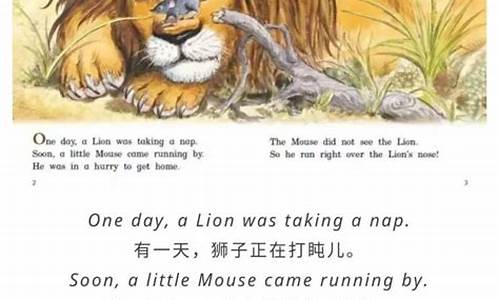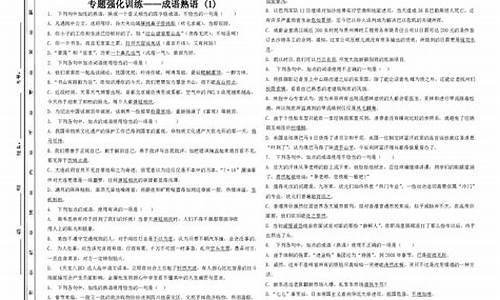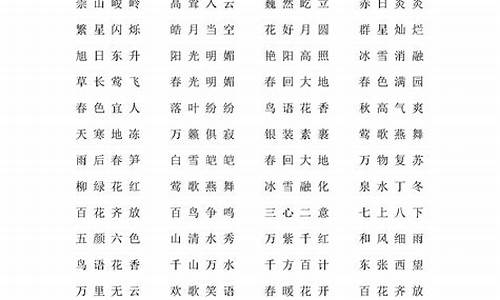您现在的位置是: 首页 > 成语典故 成语典故
英语成语故事短篇
ysladmin 2024-07-18 人已围观
简介英语成语故事短篇 好久不见,今天我想和大家探讨一下关于“英语成语故事短篇”的话题。如果你对这个领域还不太熟悉,那么这篇文章就是为你准备的,让我们一起来了解一下吧。1
好久不见,今天我想和大家探讨一下关于“英语成语故事短篇”的话题。如果你对这个领域还不太熟悉,那么这篇文章就是为你准备的,让我们一起来了解一下吧。
1.求四个字的成语故事英语的
2.少儿英语成语故事:毛遂自荐
3.优秀经典成语故事中英双语?
4.谁有英语汉代成语故事?
5.英语成语故事:天衣无缝
6.英语的成语故事

求四个字的成语故事英语的
Amazing the World with a Single FeatIn the Warring States Period, Duke Wei of Qi neglected state affairs, for the first three years of his reign, giving himself over to dissipation. One of his minister, Chun Yukun who had a good sense of humour, said to him:”There is a big bird which has neigher taken wing nor sung for three years.” The duke answered, “Once that bird starts to fly and sing, it will astonish the world.” The duke thereupon devoted himself to his duties and built his state up into a powerful one.This idiom is used to indicate that a person may rise from obscurity and achieve greatness.战国时代,齐威王即位后作了三年国君,只顾享乐,不理政事。有个善于说笑话的人叫淳于髡,一天对齐威王说:“城里有一只大鸟,三年不飞也不叫,你知道这是什么道理?”齐威王说:“这鸟不飞则罢,一飞就冲天;不鸣则罢,一鸣就惊人。”在淳于髡的激发下,齐威王开始治理国家,取得很大成绩,齐国的声威一直保持了几十年。
少儿英语成语故事:毛遂自荐
1. 简洁的成语故事(英文版)
郑人买履(A man from the State of Zheng bought shoes)Once upon a time , a man in the State of Zheng went to the market to buy a pair of shoes. Before he left for the market, he had measured his feet with a piece me straw. However , he couldn't find the measurement because he had left it at home . So he had to say sorry to the owner that he had to go home for it, which confused the owner why he didn't try the shoes on with his own feet . The man *** iled to the owner , " I would rather believe in the measuremens than my own feet."。
2. 英语的四字成语keep somebody at arm's length, 形影不离
be on one's back, 卧病在床
make somebody's blood boil, 热血沸腾
Keep one's shirt on, 忍辱负重
Shout something from the roofs , 登高而呼
Be all ears, 洗耳恭听
out of the blue, 猝不及防
at sixes and sevens, 乱七八糟
A bolt from the blue 晴天霹雳
love you love your dog 爱屋及乌
a bad le, 金玉其外,败絮其中
It rains dogs and cats.倾盆大雨
Fish in trouble water.混水摸鱼
Teach fish to swim.班门弄斧
Beat the dog before the lion.杀鸡敬猴
3. 英语的四字词语繁荣昌盛thriving and prosperous爱不释手fondle admiringly爱财如命skin a flea for its hide爱屋及乌love me, love my dog. He that loves the tree loves the branch恨屋及乌:He who hates Peter har his dog.)安居乐业live and work in peace and contentment白手起家build up from nothing / build up from scratch /start from scratch百里挑一one in a hundred / the cream of the crop百折不挠be indomitable半途而废give up halfway lee sth. Unfinished包罗万象all-embracing all-inclusive饱经风霜weather-beaten卑躬屈膝bow and scrape cringe悲欢离合vicissitudes of life背道而驰run counter to run in the opposite direction本末倒置put the cart before the horse笨鸟先飞the slow need to start early必由之路the only way闭关自守close the country to international intercourse变本加厉be further intensified变化无常chop and change fantasticality 变化无常chop and change fantasticality别开生面hing sth. New别有用心he ulterior motives彬彬有礼refined and courteous urbane兵不厌诈in war nothing is too deceitful博古通今erudite and informed不败之地incincible position不耻下问feel not ashamed to learn from one's subordinates不可救药be past praying for beyond redemption不劳而获reap where one has not sown不屈不挠fortitude indefatigability perseverance persevere tenacity不速之客crasher uninvited guest不同凡响outstanding不言而喻speak for itself tell its own story tell its own tale went without saying不遗余力spare no effort spare no pains不以为然not rove object to不义之财filthy lucre filthy pelf the mammon of unrighteousness不亦乐乎extremely不远千里go to the trouble of trelling a long distance不约而同hen to coincide不择手段by any kind of means by hook or crook play hard by fair means or foul不知所措be at a loss be all adrift lose one's head out of one's wits才疏学浅he little talent and learning惨绝人寰extremely cruel沧海桑田time brings a great change to the worlds沧海一粟/九牛一毛a drop in the bucket草木皆兵a state of extreme nervousness层出不穷emerge in endlessly。
4. 英语的四字成语优质解答keep somebody at arm's length,形影不离 be on one's back,卧病在床 make somebody's blood boil,热血沸腾 Keep one's shirt on,忍辱负重 Shout something from the roofs ,登高而呼 Be all ears,洗耳恭听 out of the blue,猝不及防 at sixes and sevens,乱七八糟 A bolt from the blue 晴天霹雳love you love your dog 爱屋及乌 a bad le,金玉其外,败絮其中It rains dogs and cats.倾盆大雨 Fish in trouble water.混水摸鱼 Teach fish to swim.班门弄斧 Beat the dog before the lion.杀鸡敬猴。
优秀经典成语故事中英双语?
volunteer to do sth/remend oneself毛遂自荐
In the Warring States Period, the State of Qin besieged the capital of the State of Zhao.战国时代,秦国军队攻打赵国的都城。
Duke Pingyuan of Zhao planned to ask the ruler of the State of Chu personally for assistance.He wanted to select a capable man to go with him. 赵国的平原君打算亲自到楚国去请救兵,想挑选一个精明能干的人一同前去。
A man called Mao Sui volunteered. 有一个名叫毛遂的人,自告奋勇愿意同去。
When the negotiactions between the two states were stalled because the ruler of Chu hesitated to send troops, Mao Sui roached him, brandishing a sword. At that, the ruler of Chu agreed to help Zhao, against Qin.平原君到楚国后,与楚王谈了半天,没有一点结果。毛遂怒气冲冲地拿着宝剑,逼近楚王,终于迫使楚王答应出兵,与赵国联合共同抵抗秦国。
This idiom means to remend oneself.“毛遂自荐”这个成语用来比喻自己推荐自己,不必别人介绍。
文化链接
英文中“毛遂自荐”可以说成“volunteer to do sth”,“volunteer”既可以作名词,也可以作动词,作名词时的意思是“志愿者”,作动词就可以解释为“志愿去做什么事”,就是“毛遂自荐”啦~
我们来一起看几个例句吧~
Our pany volunteered to support and help the victims. 我们的公司毛遂自荐来帮助受灾灾民。
You can volunteer to work one or multiple shifts。你可以毛遂自荐做单班制,也可以选择多班制。
谁有英语汉代成语故事?
如果觉得学英语觉得枯燥的话,可以加点乐趣的元素进去。我在此献上英语故事,希望对你有所帮助。
成语寓言故事:Playing the Lute to a Cow对牛弹琴
Gong Mingyi was a famous musician in ancient times, who played the lute very well.
公明仪是古代一位很有名的音乐家,弹得一手好琴。
One day, while playing the lute indoors, Gong Mingyi saw a cow eating grass leisurely outside the window. He had a sudden whim to play some melodies for the cow. He first played the "Exercise of Qing Jiao", but the cow still kept on eating grass with head lowered. He seemed to realize that the melody was too highbrow for the cow to understand.
有一天,他在室内弹琴,看见一头牛在窗外悠闲地吃著草。他忽然想弹几曲给牛听听。他先弹了一曲“清角之操”。可是,牛还是跟刚才一样,只顾低着头吃草。他似乎意识到,这支曲子太高雅了,牛没有听懂。
So he played several other melodies, imitating the buzzing sounds of swarms of flying mosquitoes, and the bleats of a calf looking for its panions. At this, to his surprise, the cow sped eating grass, but raised its head, pricked up its ears, wagged its tail and, pacing up and down in *** all steps, began to listen attentively.
于是,他弹了另外几支曲子,模拟蚊子成群结队飞来飞去的嗡嗡声;模拟小牛犊寻找伙伴的眸眸叫唤声。这样一来,这头牛竟然不吃草了,抬起头,竖着耳朵,甩著尾巴,迈著小步,留心地倾听起来。
成语寓言故事:The Gentleman on the Beam梁上君子
One year in the Eastern Han Dynasty, there was a serious famine in I-Jenan.
东汉时的某一年,河南一带,饥荒严重。
One night, a thief sneaked into Chen Shi's house and hid himself on the beam. When Chen Shi was aware of this, he got out of bed without haste, called his children and grandchildren to his room and said in a stern voice:
一天夜里,一个小偷潜人陈宴家,躲藏在屋子的横梁上。陈宴觉察到后,不慌不忙地起了床,把儿女子孙们都叫到屋里,严厉地说:
"One must always restrain and encourage oneself no matter under what circumstances. Bad men were not born bad. It is only bee they don't restrain themselves that they develop bad habits and turn bad gradually. That gentleman on the beam is just a case in point."
“一个人无论在什么情况下,都要克制自己,勉励自己。坏人,不是天生就坏,而是因为平时不克制自己而养成了坏的习惯,才慢慢地变坏的。那位梁上君子就是这样。”
Much ashamed upon hearing this, the thief hiding on the beam promptly jumped down to the ground, kowtowed and begged for forgiveness.
躲在梁上的小偷听了,很惭愧,连忙翻身落地,磕头求饶。
Chen Shi enlightened him by saying:
陈宴开导他说:
"Judging from your earance, you don't look like a bad man. Perhaps you are driven by poverty to steal. But you should carefully examine yourself and turn over a new leaf."
“看你的样子并不像坏人,你这样做,恐怕也是被贫困逼出来的。不过你应当好好反省,改邪归正。”
Then he immediately asked someone to bring two bolts of white silk to give the thief as a present. The thief kowtowed and thanked him repeatedly.
接着,他马上叫人拿来两匹白绢赠送给小偷。小偷不停地磕头致谢。
Since then, very few thefts occurred in this locality.
从此以后,这个地方很少发生偷盗的事情。
成语寓言故事:Cutting the Fabric to Admonish the Hu *** and断织诫夫
A long time ago, in Henan there was a young man named Le whose family was very poor.
从前,河南有个青年,名叫乐羊子,家里很穷。
One day, Le Yangzi picked up a piece of gold on the road. He hily took it home and ge it to his wife. His wife said in all seriousness:
有一天,乐羊子在路上拾到一块金子,高高兴兴地拿回家,交给妻子。妻子却一本正经地说:
"I heard that men with aspiration do not drink from the Dao ***meaning steal in Chinese*** Spring, and honest men do not take handout food. Furthermore, picked-up money and things will stain one's moral character."
“我听说,有志气的人不喝盗泉之水,廉洁的人不吃磋来之食;何况,这拾来的钱物,会玷污一个人的品德!”
Hearing this, Yangzi was very ashamed of himself. So he threw the piece of gold away in the open field.
乐羊子听了妻子的话,心里感到非常惭愧,就把金子扔到野外去了。
This incident touched Le Yangzi deeply. He made up his mind to lee home and go to a faraway place to study under a master.
这件事,对乐羊子的触动很大。他下了决心,离家去很远的地方,拜老师学习。
One year later, Le Yangzi returned home. His wife inquired why he returned so soon. Le Yangzi *** iled and said:
一年以后,乐羊子回到家里。妻子询问丈夫为什么这么快就回来了。乐羊子笑着说:
"There is no other reason except that I, being all alone away from home, miss you so much that I e back."
“没有别的原因,只是一个人在外面太想念你了,所以就回来了。”
His wife turned pale at his words. She took up a knife, ran to the silk loom, put the knife on the silk fabric woven from natural silk, and said to Le Yangzi in an agitated tone:
妻子一听,脸色变得刷白。她顺手拿起一把刀,奔到丝织机前,把刀放在蚕丝织成的绸面上,激动地对乐羊子说:
"I reeled silk strand by strand from cocoons and, with the shuttle moving to and fro, weed it inch by inch into this bolt of silk fabric. Now if I should cut the fabric with the knife, all the previous efforts and time I've devoted would be wasted. While studying, you should always remind yourself that there is yet much more to learn. Only in this way can you cultivate a noble moral character. If you give up halfway, it will be just like cutting up this silk fabric at one stroke."
“这丝绸,是我从蚕茧缴成丝线,一丝一缕,一梭子来,一梭子去,一寸一寸地织,才织成这一匹的啊!现在,我使一刀割断这匹丝绸,岂不前功尽弃,白白地浪费了时间吗?你呀,读书求知识,也应该随时提醒自己学得还很不够,这样才能养成高尚的品德。如果你半途而废,那么跟一刀割断这匹丝绸又有什么两样呢!”
Deeply moved by his wife's words, Le Yangzi bid farewell to her at once, went to the faraway place, and made determined efforts to study hard. He had been away from home for a good seven years, and finally succeeded in his studies.
听了妻子的这番话,乐羊子深深地感动了。他马上告别了妻子,去远方发愤攻读,整整七年没有回家,最后终于学成功了。
英语成语故事:天衣无缝
一.刻舟求剑Making His Mark A man from the state of Chu was crossing a river. In the boat, his sword fell into the water. Immediately he made a mark on the boat. "This is where my sword fell off," he said. When the boat sped moving, he went into the water to look for his sword at the place where he had marked the boat. The boat had moved but the sword had not. Is this not a very foolish way to look for a sword? 战国时,楚国有个人坐船渡江。船到江心,他一不小心。把随身携带的一把宝剑掉落江中。他马上掏出一把小刀,在船舷上刻上一个记号,说:“这是我宝剑落水的地方,所以我要刻上一个记号。” 船靠岸后,那楚人立即从船上刻记号的地方跳下水去捞取掉落的宝剑。捞了半天,仍不见宝剑的影子。其实他又怎么找得到宝剑呢?船继续行驶,而宝剑却不会再移动。像他这样去找剑,真是太愚蠢可笑了。 二 守株待兔Staying by a Stump Waiting for More Hares To Come and Dash Themselves Against It Staying by a Stump Waiting for More Hares To Come and Dash Themselves Against It This story took place more than 2,000 years ago,in the Warring States period(475-221 B.C.).Tradition has it that in the State of Song at that time there was a man who was famous for staying by a stump waiting for more hares to e and dash themselves against it. He was a yong farmer,and his family had been farmers for generations.Year after year and generation after generation, farmers used to sow in spring and harvest in autumn,beginning to work at sunrise and retiring at sunset.In good harvest years,they could only he enough food to eat and enough clothing to wear.If there was a famine due to crop failure,they had to go hungry. This young farmer wanted to improve his life.But he was too lazy and too cowardly.Being lazy and cowardly over everything,he often dreamed of hing unexpected blessings. A miracle took place at last. One day in late autumn,when he was ploughing in the field,two groups of people were hunting nearby.As shoutings were rising one after another,scared hares were running desperately.Suddenly,a blind hare dashed itself headlong against the stump of a dead tree in his field and died. That day,he ate his fill. From that day on,he no longer went in for farming again.From morning till night,he stayed by that miraculous stump,waiting for miracles to take place again. This story es from"The Five Vermin"in The Works of Han Feizi.Later generations often use the set phrase"staying by a stump waiting for more hares to e and dash themselves against it"to show grusting to chance and windfalls or dreaming to reap without sowing.It is also used to show adhering to narrow experiences and not being able to be flexible. 相传在战国时代宋国,有一个农民,日出而作,日入而息.遇到好年景,也不过刚刚吃饱穿暖;一遇灾荒,可就要忍饥挨饿了.他想改善生活,但他太懒,胆子又特小,干什么都是又懒又怕,总想碰到送上门来的意外之财。 奇迹终于发生了。深秋的一天,他正在田里耕地,周围有人在打猎。吆喝之声四处起伏,受惊的小野兽没命的奔跑。突然, 有一只兔子,不偏不倚,一头撞死在他田边的树根上。 当天,他美美地饱餐了一顿。 从此,他便不再种地。一天到晚,守着那神奇的树根,等着奇迹的出现。 成语“守株待兔”,比喻亡想不劳而得,或死守狭隘的经验,不知变通。 "An illusory snake in a goblet" is used to describe the psychological state of being frightened caused by taking illusions as reality. “杯弓蛇影”比喻把虚幻当作真实的恐惧心理。 ------------------------------------------------------- In Jin Dynasty there was a man named Yue Guang who was fond of drinking alcohol. 晋朝有个叫乐(yuè)广的人,爱喝酒。 One day, he invited a friend to his house to drink together. 一天,他邀请朋友到家里来对斟(zhēn)对饮。 Suddenly, his friend saw the reflection of a snack swimming in the goblet. 忽然,朋友看见酒杯里有条蛇影在游动。 He got so much frightened that he took ill on bed after getting home. 他受了惊吓,回去便一病不起。 And neither any doctor or any medicine could cure his illness. 请医服药,都无起色。 Yue Guang came to see him and asked about the cause of his disease. 乐广跑来看他,问明起病的缘由。 When he got to know the cause, he pulled his friend from the bed immdiately and took him to his house. 乐广听后一把拉起朋友往家走。 Yue Guang made his friend sit where he used to, pouring a goblet of alcohol for him, and asked him," Is there any snake reflection in the goblet?" 他让朋友坐在原处,斟满酒问:“有蛇影吗?” There was still a "snake reflection" in the goblet! Yue casually took away the bow hanging on the wall. 杯子里还有“蛇影”!乐广随手取下墙上的弓。 This time, the "snake reflection" diseared. 这次,“蛇影”不见了! "So it was the bow reflection that was in the goblet!" His friend at once got well from his illness. “杯子里原来是弓影呀!”朋友的病情顿时好了! 天衣无缝 There was a man called Guo Han in the Tang Dynasty(618-907).One summer night, when the moon was very bright he suddenly saw a girl descending slowly from the sky. He observed the girl closely, and found that the dress she was wearing was seamless. He was puzzled, and asked why. The girl answered,"Heenly clothes are not sewn with needle and thread." This idiom is used metaphorically to indicate the flawless handling of things. It can also be used to indicate a perfectly written poem or other literary article. 唐朝有个人教郭翰。一个夏天的晚上,月光非常明亮,他忽然看见天空中有个女子轻盈而缓慢地飘落下来。他仔细地观察那个女子,发现她身上穿的衣服连一条缝也没有,感到非常奇怪,便问那个女子。女子回答说:“天衣本来就用不着针线缝合的呀!” 这个成语用来比喻处理事情十分周密,不露一点痕迹。也比喻诗文写得很精辟,找不出一点毛病。 一丘之貉 In the Han Dynasty, there was an official called Yang Yun who was both capable and honest. Commenting on the assassination of a king of a small state, he said, “If a king refuses to follow the advice of a wise minister, he will suffer an unitimely death. The emperor of the Qin Dynasty trusted treacherous ministers, and therefore lost his state.” He pared kings and emperors to racoons living on the same mountain. This idiom refers derogatorily to people who are of the same kind. 汉朝时,有个叫杨恽的人,在朝廷做官,廉洁无私,有很有才能。有一次,他听说一个小国王被杀死,就发表议论说:“君王不纳贤臣的计策,就会得到这种下场。秦朝皇帝宠信奸臣,所以亡国;如果重用贤臣,他的国家就不会灭亡了。”他最后总结说,古今的帝王都不过是一个山丘上的貉而已。 这个成语比喻某些人彼此相同,或者都是坏人。 黔驴技穷 从前,贵州没有驴子,有人从外地带回一头驴子,拴在山下,一只老虎看到了,以为是什么怪物,急忙躲到树林中去头头地瞧。驴子大叫一声,老虎吓了一跳,以为驴子要吃掉自己。时间一长,老虎觉得驴子没有什么恶意,逐渐走近去戏弄它,触犯它。驴子生气了,用蹄子踢老虎。老虎心里想:“你的本领不过就是如此啊!”于是立刻扑过去,一口把它咬死吃掉了。 这个成语比喻仅有的一点本事也用完了,在没有别的办法了。 The Guizhou Donkey Has Exhausted It's Tricks In ancient times there were no donkeys in Guizhou province. Somebody brought a donkey from somewhere and tied it to a tree at the foot of a mountain. A tiger saw the donkey, and thought that it must be a fearsome monster. It hide behind a tree and spied on the donkey. When the donkey brayed, the tiger was frightened, thinking that the donkey was about to devour it. After a while, seeing that the donkey had not moved, the tiger roached it and teased it. The donkey became angry, and kicked the tiger. The tiger thought to itself:"It then all it is capable of?" It then jumped on the donkey and ate it. This idiom is used to mean that one has exhauseted one's skills.
英语的成语故事
one summer night, when the moon was very bright he suddenly saw a girl descending(下降) slowly from the sky. he observed the girl closely, and found that the dress she was wearing was seamless(无缝的) . he was puzzled, and asked why. the girl answered,"heenly clothes are not sewn with needle and thread."
传说古代太原人郭翰在夏夜里乘凉,见一个仙女从天上下来,她身穿白衣,美丽绝伦。她告诉他她名叫织女。郭翰仔细欣赏织女的衣裳浑然一体,竟看不出一丝线缝,好奇问织女。织女答道:“天衣本非针线为也。”
this idiom is used metaphorically to indicate the flawless handling of things. it can also be used to indicate a perfectly written poem or other literary article.
神话传说,仙女的衣服没有衣缝。比喻事物周密完善,找不出什么毛病。
望纳。
谁有英语成语故事?~~~(中学水平)
画蛇添足
An official of the ancient State of Chu awarded a pot of wine to his men after the ceremony of Spring Sacrifice. One man said, “We he only one pot of wine. It's not enough for all of us but sufficient for one. Let's determine who'll he the wine by drawing a snake on the ground. He who finishes first will he the wine.”
The others agreed. Very soon, one man finished his snake. He was about to drink the wine when he saw the others were still busy drawing. He said placently,“How slowly you are! I still he enough time to add feet to my snke.” But before he finished the feet, another man finished his snke and grabbed the pot from him, saying,“Whoever has seen a snake with feet? Yours is not a snke. So the wine should be mine!” He drank the wine. The man adding the feet to the snake had to give in and could only regret his foolishness.
楚国有一个官员,在春天祭过了祖宗之后,便将一壶酒赏给他的办事人员喝。有人提议:“我们只有一壶酒,肯定不够我们大家喝的,一个人喝倒是绰绰有余。我们每人在地上画一条蛇,谁画得最快,就把这壶酒给他。” 大家都同意了。
有一个人很快就把蛇画好了。他正打算喝这壶酒时,看见别人都还忙着画呢。他就得意扬扬地说:“你们画得好慢呀,等我再画上几只脚吧!” 他的蛇脚还没画完,另一个人已经把蛇画好了。那人把酒壶夺了过去说:“有谁见过长脚的蛇?你画的不是蛇,这壶酒应该是我的了。”说罢,就喝起酒来。那个给蛇画脚的人没办法,只能懊悔自己的愚蠢。
一鸣惊人
In the Warring States Period, Duke Wei of Qi neglected state affairs, for the first three years of his reign, giving himself over to dissipation. One of his ministers, Chun Yukun who had a good sense of humour, said to him: 'There is a big bird which has neither taken wing nor sung for three years.' The duke answered, 'Once that bird starts to fly and sing, it will astonish the world.' The duke thereupon devoted himself to his duties and built his state up into a powerful one.
战国时代,齐威王即位后做了三年国君,只顾享乐,不理政事。有个善于说笑话的人叫淳于髡,一天对齐威王说:“城里有一只大鸟,三年不飞也不叫,你知道这是什么道理?”齐威王说:“这鸟不飞则罢,一飞就冲天;不鸣则罢,一鸣就惊人。”在淳于髡的激发下,齐威王开始治理国家,取得很大成绩,齐国的声威一直保持了几十年。
杞人忧天
In the Spring and Autumn Period, in the State of Qi there was a man who always let his imagination run away with him. One day he even worried that the sky would fall on his head. He was so worried that he could neither eat nor sleep. Later, someone persuaded him that his fears were Ground-less.
春秋时代,杞国有一个喜欢胡思乱想的人。一天,他竟然想到,天会塌下来,地会陷下去,自己到哪里去安身?这个人越想越害怕,整天愁眉苦脸,坐立不安,白天吃不下饭,晚上睡不着觉。后来有人耐心地开到他,他才放下了心。
精卫填海
Once upon a time, the youngest daughter of Emperor Yan, legendary ruler of primitive China, went boating on the Eastern Sea. While she was enjoying herself, a strong wind rose on the sea and her boat capsized. Just before she was buried by the surging wes, her spirit turned into a beautiful bird. As it flew over the roaring sea, it cried sadly in the sound "jinwei, jingwei". That was why people called it "Jingwei".
The bird lived on a mountain near the sea. It hated the sea so much that it decided to fill it up. Every day, it flew to and fro between the mountain and the sea, carrying in a twig or a pebble from the mountain and dropping it into the sea.
One day, the roaring sea said to Jingwei, "Poor little bird, s doing that meaningless thing! You'll never fill me up." Jingwei replied, "I'll fill you up no dou! I will, even if it'll take me thousands of years! I'll fight on until doomsday!"
The bre little bird kept carrying twigs and pebbles from the mountain to the Eastern Sea without taking a rest.
From this fable es the idiom "The bird Jingwei trying to fill the sea". We use it to describe people who are firm and indomitable and will not s until they reach their goal.
从前,炎帝(传说中中国原始社会的统治者)的小女儿在东海上划船。正当她划得高兴时,海面上突然升起一阵大风,把她的小船弄翻了。就在她要被汹涌的波浪吞 没时,她的灵魂变成了一只美丽的小鸟。它飞过那咆哮的海面,伤心的叫着"精卫,精卫"的声音。所以人们就叫她"精卫"。
精卫鸟住在靠海的一座山上。它非常恨大海,所以决心要把它填平。它每天来回于山海之间,把从山上衔来的小树枝和小石子扔在大海里。
一天,咆哮的大海对精卫说:"可怜的小鸟,停止你那无谓的举动吧!你是永远都填不平我的。" 精卫回答说:"我当然会把你填平的!即使这需要千千万万年的时间,我也一定会斗争到底,直到你的末日来临!"
这只勇敢的小鸟继续从山上衔来小树枝和小石子,扔到东海中,从未有片刻休息。
"精卫填海"这个成语就是由这个传说而来的,形容那些坚定不移,不屈不挠,不到目的决不罢休的人。
守株待兔
春秋时代,宋国有个农夫,一天在耕田的时候,忽然跑来一只兔子,恰好碰在树桩上,脖子折断死了。农夫把兔子拾回家去,美美地吃了一顿兔肉。晚上他想:“我何必辛辛苦苦的种地呢?每天在树下能捡到一只兔子就够我吃的了。”于是他从此不再耕种,每天坐在树下等待兔子的到来。
这个成语,讥笑那些不想经过努力,存在侥幸心理,希望得到意外收获的人。
Sitting by a Stump, Waiting for a Careless Hare
In the Spring and Autumn Period, a former in the state of Song was one day working in the fields when he saw a rabbit bump into a tree stump accidentually and break its neck. The former took the rabbit home and cooked himself a delicious meal. That night he thought:"I neednt work so hard. All I he to do is wait for a rabbit each day by the stump." So from then on he ge up farming, and simply sat by the stump waiting for the rabbits to e and run into it.
This idiom satirizes those who just wait for a stroke of luck, rather than making efforts to oain what they need.
好了,关于“英语成语故事短篇”的话题就讲到这里了。希望大家能够对“英语成语故事短篇”有更深入的了解,并且从我的回答中得到一些启示。







